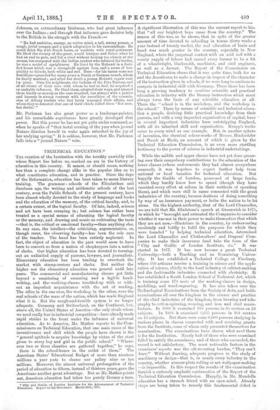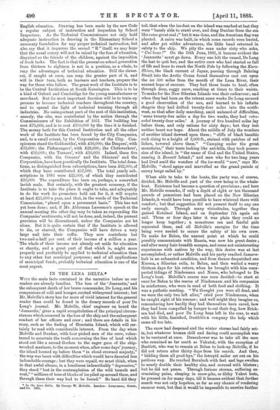TECHNICAL ED CAT ION.*
Tax creation of the Institution with the terribly unwieldy title whose Report lies before us, marked an era in the history of .education in this country. It meant, or should mean, nothing less than a complete change alike in the popular idea as to what constitutes education, and in practice. Since the days of the Reformation, education has been taken to mean literary training. The grammar schools of the Elizabethan and Jacobean age, the writing and arithmetic schools of the last century, even the Public Schools of the present century, have been almost wholly devoted to the study of language and books and the education of the memory, of the critical faculty, and, to a certain extent, of the logical faculty. Of late, indeed, science and art have been creeping in ; but science has rather been treated as a special means of educating the logical faculty or the memory, and drawing and music as cultivating the taste —that is, the critical or emotional faculty—than anything else. In any case, the intellect—the criticising, argumentative, or, though rarer, the observing faculty—has been the sole care of the teacher. The hand has been entirely neglected. In fact, the object of education in the past would seem to have been to convert us from a nation of shopkeepers into a nation of clerks. Our higher education has been devoted to turningont an unlimited supply of parsons, lawyers, and journalists. Elementary education has been tending to overstock the market with stump-orators and clerks. But neither the higher nor the elementary education was general until late years. The commercial and manufacturing classes got little beyond a smattering of summing and a legible handwriting, and the•working-classes tumbled-up with or without an imperfect acquaintance with the art of reading. The office in the one case, the workshop in the other, were the real schools of the mass of the nation, which has made England -what it is. But the rough-and-tumble system is no longer adequate. Germany and Switzerland, on the Continent, but, above all, the United States of America—the only rivals whom we need really fear in industrial competition----have already made rapid strides to the front under the influence of universal education. As to America, Mr. Mather reports to the Commissioners on Technical Education, that one main cause of the inventiveness and skill which the people have shown is the "general aptitude to acquire knowledge by virtue of the start given to every boy and girl in the public school." " Whereever two or three shanties are gathered together," he says,
there is the school-house in the midst of them." The American States' Educational Budget of more than nineteen millions a year puts to shame our paltry nine or ten millions. Moreover, the almost universal prolongation of the period of education to fifteen, instead of thirteen years, gave the Americans another great advantage. But as Mr. Mather points oat, American education had taken too purely literary a turn.
A significant illustration of this was the current report to him that " all our brightest boys • came from the country." The reason of this was, as he shows, that in spite of the greater amount of time devoted to schooling in towns (forty weeks a year instead of twenty weeks), the real education of brain and hand was much greater in the country, especially in New England, where the perpetual contest with an arid soil with a scanty supply of labour bad caused every farmer to be a bit of a wheelwright, blacksmith, machinist, and civil engineer, as well as a farmer. The Report of the Commission on Technical Education shows that it was quite time, both for us and the Americans, to make a change in respect of the character of the instruction given in schools, if we were long to continue to compete in industrial skill with Germany. There there has been long a growing tendency to combine scientific and practical education in industry with the literary instruction which must always form the basis of any scientific education at all. There the " school is in the workshop, and the workshop in the school." There by means of scientific and technical education a people, deriving little practical knowledge from their parents, and with a very imperfect organisation of capital, have in several important industries been outstripping England, with all its inherited skill and organisation. Krupp's works occur to every mind as one example. But, in another sphere of invention, the chemical colour-works of Messrs. Bindsedeler and Busch at Basle, an account of which is given by the Technical Education Commission, is an even more startling testimony to the power of science in industrial undertakings.
While the middle and upper classes have not yet done groaning over their compulsory contributions to the education of the lower classes (whose endowments they had almost everywhere annexed), it was hopeless to expect further help from national or local taxation for technical education. But happily the Guilds of London, possessed of large funds, which they hardly know how to spend (though they have resented every effort at reform in their methods of spending them), and which were still in name connected with the great industries of the country, became desirous of doing something by way of an insurance payment, or bribe the nation to be let alone. On the highest authority, that of the Lord Chancellor, we are told that Mr. Gladstone's speech at Greenwich in 1875, in which be " besought and entreated the Companies to consider whether it was not in their power to make themselves that which they are not now,—illustrious in the country, by endeavouring resolutely and boldly to fulfil the purposes for which they were founded " by helping technical education, determined the Lord Chancellor and Clothworkers' and Drapers' Companies to make their insurance fund take the form of the. " City and Guilds of London Institute, &c." It was started in 1877. It has now become a great Technical University,—both a Teaching and an Examining University. It has established a Technical College at Finsbury, where 500 artisans receive a training in science and the application of science, chiefly to the local industry of cabinet-making and the fashionable industries connected with electricity. It has established a South London School of Technical Art, which is training some 174 more of the working-classes in design, modelling, and wood-engraving. It has also taken over the Technological Examinations from the Society of Arts, and holds examinations all over the kingdom in the science and practice of the chief industries of the kingdom, from brewing and telegraphy to cotton-spinning, weaving, and iron and steel manufacture. In 1880 it examined 816 persons in 85 centres on 24 subjects. In 1884 it examined 3,635 persons in 164 centres on 43 subjects. But there were some 6,000 persons studying in various places in classes connected with and receiving grants from the Institute, some of whom only presented themselves for examination. The examinations have shown what need there is for the Institution. Nearly half of those who were examined failed to satisfy the examiners; and of those who succeeded, the record is not satisfactory. The most noticeable feature in the examiners' reports was the oft-recurring burden, "They can't draw." Without drawing, adequate progress in the study of machinery or design—that is, in nearly every industry in the country, whether armour-plate rolling or art wallpaper-making —is impossible. In this respect the results of the examination furnish a curiously emphatic confirmation of the Report of the , Technical Education Commission. Happily, in Mr. Mundella education has a staunch friend with an open mind. Already steps are being taken toremedy this fundamental defect in English education. Drawing has been made by the new Code a regular subject of instruction and inspection by School Inspectors. As the Technical Commissioners not only hold adequate instruction in drawing in the Elementary School a necessary foundation for any proper technical instruction, but also say that it improves the second " R " itself, we may hope that the usual outcry will not be raised by the foes of education, disguised as the friends of the children, against the imposition of fresh tasks. The fact is that the present ex-school generation from thirteen to eighteen is not in a position, as a whole, to reap the advantages of technical education. Still the clever. est, if caught at once, can reap the greater part of it, and will in their turn, both as learners and teachers, prepare the way for those who follow. The great work of the Institute is to be the Central Institution at South Kensington. This is to be a kind of Oxford and Cambridge for the young manufacturer or merchant. But its most important function will be to train-up persons to become technical teachers throughout the country, and to spread the light of technical training through all industries. No unimportant part of the cost of this institution, namely, the site, was contributed by the nation through the Commissioners of the Exhibition of 1851. The building has cost £75,000, and is to cost £100,000 by the time it is finished. The money both for this Central Institution and all the other work of the Institute has been found by the City Companies, and, to a small extent, by the Corporation of the City. Conspicuous stand the Goldsmiths', with £36,000; the Drapers', with £33,000; the Fishmongers', with £28,000; the Clothworkers', with £30,000; the Turners', with £16,000. Indeed, these five Companies, with the Grocers' and the Skinners' and the Corporation, have been practically the Institute. The total donations, as distinguished from subscriptions, have been £62,000, of which they have contributed £57,000. The total yearly subscriptions in 1884 were £22,000, of which they contributed £20,000. The expenditure has been on, perhaps, a somewhat lavish scale. But certainly, with the greatest economy, if the Institute is to take the place it ought to take, and adequately to do the work its promoters held out for it, it will require at least £25,000 a year, and that, in the words of the Technical Commission, "placed upon a permanent basis." This has not yet been done ; and, if Mr. Alderman Lawrence's speech at the annual meeting the other day may be taken as expounding the Companies' sentiments, will not be done, and, indeed, the present provision will be discontinued, unless the Companies are let alone. But it is quite certain that if the Institute is allowed to die, or starved, the Companies will have driven a very large nail into their coffin. They now contribute but two-and-a-half per cent. of their income of a million a year. The whole of their income not already set aside for education or charity, and a great part of that which is, might more properly and profitably be applied to technical education than to any other but municipal purposes ; and of all applications of municipal funds, probably technical education is one of the most urgent.



































 Previous page
Previous page